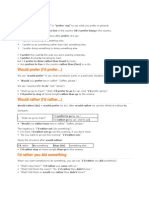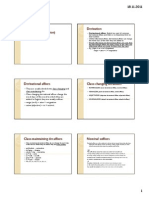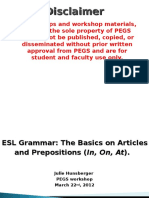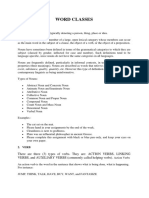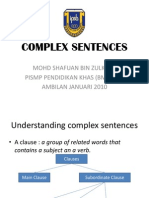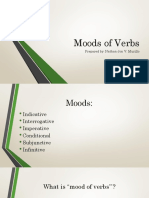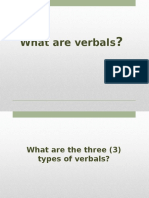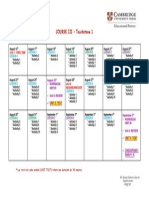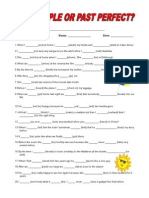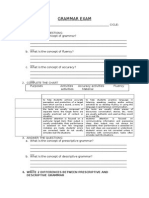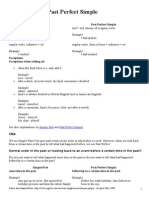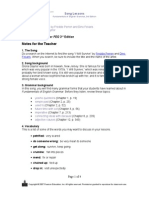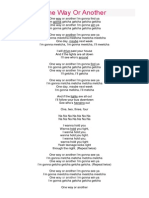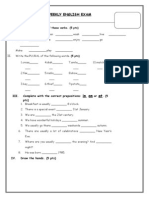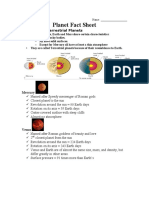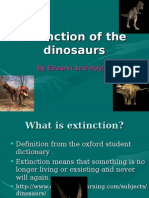Articles
Articles
Uploaded by
Fredy Jesus Choque HinojoCopyright:
Available Formats
Articles
Articles
Uploaded by
Fredy Jesus Choque HinojoOriginal Description:
Copyright
Available Formats
Share this document
Did you find this document useful?
Is this content inappropriate?
Copyright:
Available Formats
Articles
Articles
Uploaded by
Fredy Jesus Choque HinojoCopyright:
Available Formats
Nouns can be either countable or uncountable.
Countable nouns are those which can have the word a/an before them or be used in the plural.
We've got three children, two cats, and a dog.
Uncountable nouns are not used with a/an or in the plural. This sentence includes countable nouns in bold:
This sentence includes uncountable nouns in bold: It was good to get out into the countryside and breathe in some fresh air.
Some nouns in English are normally uncountable; in many other languages they are countable:
There's always lots of housework to do. Her jewellery must have cost a fortune.
Here are some more nouns like this: accommodation, advice, applause, assistance, baggage, camping, cash, chaos, chess, clothing, conduct, courage, cutlery, dancing, dirt, employment, equipment, evidence, fun, furniture, harm, health, homework, housing, information, leisure, litter, luck, luggage, machinery, money, mud, music, news, nonsense, parking, pay, permission, photography, poetry, pollution, produce, progress, publicity, research, rubbish, safety, scenery, shopping, sightseeing, sunshine, transport, underwear, violence, weather, work.
Sometimes a noun is used uncountably when we are talking about the whole substance or idea, but countably when we are talking about
recognised containers for things. Compare: I prefer tea to coffee. and Three teas (= cups of tea), please.
a type, brand or make of thing. Compare: There's cheese in the fridge. and There were dozens of cheeses (= kinds of cheese) to choose from.
a particular example of a physical or concrete thing. Compare: She has blonde hair. and There's a hair in my soup!
a particular instance of a substance or an idea. Compare: The statue was made of stone. and I had a stone in my shoe. She was always good at sport. and Football is mainly a winter sport in Britain.
2
There are many nouns like this, including
beer, coffee, water; fruit, shampoo, toothpaste, washing powder; cake, chicken, land, noise, rain, snow, sound, space, stone; abuse, (dis)agreement, business, conversation, difficulty, dislike, fear, improvement, language, life, pain, pleasure, protest, success, thought, war.
We use a/an with a singular noun when we describe someone or something or to say what type of thing someone or something is: English has become an international language. Sydney is a beautiful city. But if we say that someone or something is unique - that there is only one, or that it is the only one of its kind - we use the (or sometimes zero article, i.e. no article), but not a/an:
English has become the international language of business. Sydney is the capital city of New South Wales. We use a/an to say what a person's job is, was, or will be: She was a company director when she retired. Against her parents' wishes, she wants to be a journalist. However, when we give a person's job title, or their unique position, we use the or zero article, not a/an. Compare: Ive been appointed (the) head of the company, and I'm a production manager at Fino. (= there may be more than one production manager)
After the position of, the post of, or the role of we use zero article before a job title: Dr Simons has taken on the position of Head of Department.
Study these examples:
For lunch I had a sandwich and an
The speaker says a sandwich/an apple because this is the first time he talks about them.
apple.
The
sandwich wasnt very good.
The speaker says the sandwich because the listener now knows which sandwich he means- the sandwich he had for lunch.
Here are some more examples: There was a man talking to a woman outside my house. The man looked American, and I think the woman was Indian. When we were on vacation, we stayed at a hotel. In the evenings, sometimes we had dinner at the hotel and sometimes in a restaurant.
We use a/an when the listener doesnt know which thing we mean. We use the when it is clear which thing we mean: Tom sat on a chair. (we dont know which chair) Tom sat on the chair nearest the door. (we know which chair) Ann is looking for a job. (not a particular job) Did Ann get the job she applied for? (a particular job) Do you have a car? (not a particular car) I cleaned the car yesterday. (a particular car, my car)
We use the when it is clear in the situation which thing or person we mean. For example, in a room we talk about the light/the floor/the ceiling/the door/the carpet, etc.
4
Study these examples: Can you turn off the light, please? (=the light in this room) Where is the bathroom, please? (=the bathroom in this building/house) I enjoyed the movie. Who was the director? (=the director of the movie) I took a taxi to the station. (=the station of that town)
We say the.when there is only one of something: What is the longest river in the world? (There is only one longest river in the world.) We went to the most expensive restaurant in town. The only television program she watches is the news. Paris is the capital of France. Everybody left at the end of the meeting. The earth goes around the sun. (also: the moon/the world/the universe)
The is often used with nouns before a phrase beginning of.... The of... phrase connects this noun to a particular thing or person: Pictures can help students learn the meaning of new words. The disease could have killed off half the population of the country. He was woken up by the sound of gunfire. Compare these sentences with: Each new word has a different meaning. The country has a rapidly expanding population. He suddenly heard a sound like a gunshot. Some nouns are commonly used in the pattern the...of... to refer to a particular place, time, etc., including back, beginning, bottom, end, middle, side, top: In the middle of his speech he started to cough uncontrollably.
We use the when we know that there is only one of a particular thing. For example:
the sun the world the travel industry
the North Pole the arms trade
the jet age
the international market
The same applies to the following things when we refer to them in a general way: the weather public future the climate the environment the past the human race the sky the atmosphere the sea the the ground the wind the
However, if we want to describe a particular instance of these we use a/an. Compare: She could hear the wind whistling through the trees outside, and There's a cold wind blowing from the north. What are your plans for the future? and She dreamt of a future where she could spend more time painting.
If necessary, correct these sentences. 1 Sri Lanka has the wonderful climate. 2 The organizations aim is to educate the public about the dangers of smoking. 3 We need an environment free from pollution. 4 She has worked in a fashion industry since she left school. 5 The wind is blowing dust all the way from Africa. 6 We can look forward to a warm southerly wind this weekend. 7 The USA is a country with the high level of immigration. 8 How can we combine economic growth and respect for an environment? 9 Car exhaust emissions are having a major effect on a world's climate. 10 That's Terry - he's the third person on the right. 11 She has become the important figure in Norwegian politics. 12 It's a most important issue and we need to discuss it in detail.
Decide if the most appropriate articles (a/an and the,) are used in each of these texts. 1. Dan was playing outside in a street when he saw a red car go past driven by the teacher from his school. 2. A University has announced proposals to build a new library, to replace an existing one by the year 2005. 3. A: The car's been stolen from outside a house! B: Oh, no. I left my wallet and the camera in it. 4. I must buy the tin opener. I keep having to borrow one from a woman next door. 5. A: Jane bought a fridge and a washing machine for her house, but the washing machine wouldn't go through
7
a kitchen door so she had to send it back. B: What did a shop say? A: They offered to sell her a smaller one. 6. Now, when I start pushing a car, take your foot off the clutch. If it doesn't start then, I'll have to phone the garage. 7. We went out to the excellent restaurant last night. The food was delicious and the service was first class. 8. A: Where's a tea pot? B: It's in the cupboard on the right. A: I thought you had a blue one. B: Yes, but it broke so I had to get the new one. 9. A: I've no idea what to get Mark for his birthday. B: What about a new jumper? A: Well...it's not the very interesting present. B: Why don't you buy him a set of golf clubs he's always wanted? A: What a great idea. 10. Dr Pike has developed a way to teach musical theory. A method is designed for children over five. 11. A: Who's a woman in red? B: She's a journalist, I think. She works for a local newspaper. 12. Once, when I won the competition, I had to choose between a holiday in Disneyland and a Volvo. I chose a car, of course.
Write a sentence beginning The..of..., with a similar meaning to the one given. 1 The telephone has had an enormous impact on how we communicate. The impact of the telephone on how we communicate has been enormous. 2 The company has a complex management structure. 3 The drought had a severe effect on agriculture. 4 Picasso has had a substantial influence on modern art.
8
5 We should not underestimate how important Crogan's discovery is. 6 The bad weather meant that the bridge wasn't completed on time.
Exercise 1:
1 has a wonderful 2 3 4 in the fashion industry 5 6 7 with a high level 8 for the environment? 9 on the world's 10 11 become an important figure 12
Exercise 2: The most likely answers are given together with a brief explanation where appropriate and a comment on alternatives. 1. the street... (= it is understood which street - perhaps the one outside his house); a red car; a teacher ('the teacher' would suggest that it was a particular teacher who had already been talked about which seems unlikely in this context) 2. The University (= it is understood which university); a new library; the existing one ('the' suggests that there is only one, which seems most likely in this context); the year 2005. 3. The car's; the house (= it is understood which house; the most likely context is that it is the speaker's house); a/the camera (both 'a' and 'the' are possible here; 'the camera' would suggest an already known camera perhaps 'our' camera) 4. a tin opener; the woman next door, ('the woman' suggests the speaker is talking about a woman who is known by the hearer; 'a woman' is unlikely
9
here) 5. A: a fridge; a washing machine; but the washing machine; the kitchen door; B: the shop; A: a smaller one. 6. the car; the clutch; a/the garage, (both 'a' and 'the' are possible here; 'the garage' would suggest that the hearer will know which one is being referred to - perhaps the garage that they always use) 7. an excellent restaurant; The food; the service 8. A: the tea pot? (= the one we always use or the one I know you have) B: the cupboard; the right A: a blue one. B: a new one. 9. B: a new jumper? A a very interesting present. B: the set of golf clubs? (compare 'Why don't you buy him a set of golf clubs?') A: a great idea. 10. a way; The method 11. A: the woman B: a journalist; a/the local newspaper. (both 'a' and 'the' are possible here; 'the' suggests that B will understand which local newspaper is being referred to - perhaps there is only one) 12. a competition; a holiday; a Volvo; the car Exercise 3: 2. The management structure of the company is complex. 3. The effect of the drought on agriculture was severe. or The effect on agriculture of the drought was severe. 4. The influence of Picasso on modern art has been substantial. or The influence on modern art of Picasso has been substantial. 5. The importance of Crogan's discovery should not be underestimated. 6. The completion of the bridge was delayed by the bad weather.
10
You might also like
- Coakley10 Disc WorksheetsDocument17 pagesCoakley10 Disc WorksheetsFredy Jesus Choque Hinojo0% (1)
- MEETING 6 - 01 Grammar ExerciseDocument2 pagesMEETING 6 - 01 Grammar ExerciseWahidin Udin100% (1)
- Lesson 6 - ArticlesDocument2 pagesLesson 6 - ArticlesAkbarul AminNo ratings yet
- Culturally Relevant Supplement Rubric-For TeachersDocument1 pageCulturally Relevant Supplement Rubric-For Teachersapi-170235603No ratings yet
- Articles 1Document3 pagesArticles 1nico ryNo ratings yet
- The Black Knight, A 13000 Year Old Alien SatelliteDocument11 pagesThe Black Knight, A 13000 Year Old Alien SatelliteGordon Logan100% (1)
- CCRU Abstract Culture Digital Hyperstition 1999 PDFDocument44 pagesCCRU Abstract Culture Digital Hyperstition 1999 PDFMarta MuschiettiNo ratings yet
- Plural Nouns GeneralizationsDocument30 pagesPlural Nouns GeneralizationsFrank Haynes JrNo ratings yet
- (432813182) PrepositionsDocument2 pages(432813182) PrepositionsAlejandra B.100% (1)
- Grammar Rules and VariationsDocument4 pagesGrammar Rules and VariationsRetno Nurul AnnissaNo ratings yet
- Remember English Words QuicklyDocument50 pagesRemember English Words Quicklyiskandar12345No ratings yet
- Would RatherDocument11 pagesWould RatherBernadetta Miranti DeboraNo ratings yet
- GrammarDocument11 pagesGrammarPale VidinskaNo ratings yet
- The Use of ArticlesDocument19 pagesThe Use of Articlesavril55No ratings yet
- English DeterminersDocument12 pagesEnglish Determinerswaqarali78692No ratings yet
- Modal May/mightDocument13 pagesModal May/mightGiovanni Ar100% (1)
- Compound Nouns 1Document4 pagesCompound Nouns 1Anis SyazwaniNo ratings yet
- English Grammar 4: University OF Basrah College OF Education FOR Human Sciences Department OF EnglishDocument37 pagesEnglish Grammar 4: University OF Basrah College OF Education FOR Human Sciences Department OF EnglishNaseer الغريريNo ratings yet
- Articles: Definite, Indefinite, Zero: AandanDocument4 pagesArticles: Definite, Indefinite, Zero: AandanYanet Di PaoloNo ratings yet
- Question TagsDocument3 pagesQuestion TagsLeonore IsaacsNo ratings yet
- Before Reading: HalloweenDocument4 pagesBefore Reading: HalloweenStainbok MihaiNo ratings yet
- Morphology 5 DerivationDocument5 pagesMorphology 5 DerivationYuriatson JubhariNo ratings yet
- Relative ClausesDocument2 pagesRelative ClauseswladypaulyNo ratings yet
- Varying Sentence Structure: ReferencesDocument20 pagesVarying Sentence Structure: ReferencesKamran AzizNo ratings yet
- ACTION VERBS Are Words That Indicate ActionDocument10 pagesACTION VERBS Are Words That Indicate ActionCristianto SudinoNo ratings yet
- Lesson Plan SuperlativeDocument7 pagesLesson Plan SuperlativejosiasNo ratings yet
- ArticlesDocument34 pagesArticlessong si wonNo ratings yet
- Rumus & Contoh Kalimat: 16 English Tenses in Your MasteryDocument5 pagesRumus & Contoh Kalimat: 16 English Tenses in Your MasteryRyhena Chayyanxz Qhamhue ShelhalhuNo ratings yet
- Simple TensesDocument17 pagesSimple TensesRuslan PoltchiNo ratings yet
- T5 - Gerunds and InfinitivesDocument18 pagesT5 - Gerunds and InfinitivesnachotudelaNo ratings yet
- Conditional SentencesDocument4 pagesConditional SentencesJavier TraverNo ratings yet
- Conditional SentencesDocument8 pagesConditional SentencesSaja Lolwa100% (1)
- Stucture Word ClassesDocument10 pagesStucture Word ClassesDwiNo ratings yet
- Adverbs or AdjectiveDocument3 pagesAdverbs or AdjectiveDavinchi Davinchi DaniNo ratings yet
- Complex SentenceDocument23 pagesComplex SentenceMohd ShafuanNo ratings yet
- Intercom GrammarDocument76 pagesIntercom GrammarAisha ZiaNo ratings yet
- ContractionsDocument2 pagesContractionsCRAJ8385No ratings yet
- WC Punctuating With ApostrophesDocument2 pagesWC Punctuating With ApostrophesMian Hussain AhmadNo ratings yet
- Subordinate Clause (Also Called Dependent Clauses)Document4 pagesSubordinate Clause (Also Called Dependent Clauses)Rosana Villordon SoliteNo ratings yet
- First ConditionalDocument10 pagesFirst ConditionalMiguel Ángel100% (1)
- 1definite and Indefinite Articles PDFDocument5 pages1definite and Indefinite Articles PDFgnomonicoNo ratings yet
- Fronting and Inversion: Emphatic StructuresDocument11 pagesFronting and Inversion: Emphatic Structureshueso381No ratings yet
- Famous Movie Quotes Part 1 Reported SpeechDocument49 pagesFamous Movie Quotes Part 1 Reported SpeechCarmen IvanciucNo ratings yet
- Relative Clauses 4Document7 pagesRelative Clauses 4Makedonka JovanovskaNo ratings yet
- We Usually Use No Article To Talk About Things in General - The Doesn't Mean AllDocument13 pagesWe Usually Use No Article To Talk About Things in General - The Doesn't Mean Allulink leeNo ratings yet
- 4 AdjectivesDocument19 pages4 Adjectivesapi-252190418No ratings yet
- Regular Verbs ListDocument7 pagesRegular Verbs ListYolandaNo ratings yet
- I. WH Questions: Unit 5: Great Places To Visit (Week 6)Document10 pagesI. WH Questions: Unit 5: Great Places To Visit (Week 6)Duong Huong ThuyNo ratings yet
- Error SpottingDocument9 pagesError SpottingBrito RajNo ratings yet
- Degree of ComparisonDocument8 pagesDegree of ComparisonAnggraeniNo ratings yet
- Moods of VerbDocument13 pagesMoods of VerbjhonNo ratings yet
- English Grammar - SentencesDocument2 pagesEnglish Grammar - SentencesVeronica HornNo ratings yet
- InfinitivesDocument12 pagesInfinitivesdinejedidahNo ratings yet
- List of Degrees of ComparisonDocument4 pagesList of Degrees of Comparisonhussainmairala123No ratings yet
- Shopping Role-Play 1Document3 pagesShopping Role-Play 1MrJuice007No ratings yet
- Verbal AbilityDocument87 pagesVerbal AbilityVaskar Roi100% (1)
- GrammarDocument44 pagesGrammarjohnnyNo ratings yet
- Presentation (Count, Noncount)Document33 pagesPresentation (Count, Noncount)kuanzc100% (1)
- The Participles 2Document13 pagesThe Participles 2krostinichu100% (1)
- Active and Passive VoiceDocument15 pagesActive and Passive VoiceShaurya ManiktalaNo ratings yet
- Parts of SpeechDocument28 pagesParts of SpeechMuhammad ImranNo ratings yet
- Preston Lee's Conversation English For Vietnamese Speakers Lesson 1: 20From EverandPreston Lee's Conversation English For Vietnamese Speakers Lesson 1: 20No ratings yet
- Preston Lee’s 2-in-1 Book Series! Beginner English & Conversation English Lesson 1: 20 For Portuguese SpeakersFrom EverandPreston Lee’s 2-in-1 Book Series! Beginner English & Conversation English Lesson 1: 20 For Portuguese SpeakersNo ratings yet
- Prepositions of PlaceDocument1 pagePrepositions of PlacePaula Vianne Pardo0% (2)
- COURSE III - Touchstone 1: Unit 5: Free TimeDocument1 pageCOURSE III - Touchstone 1: Unit 5: Free TimeFredy Jesus Choque HinojoNo ratings yet
- Essential QuestionsDocument11 pagesEssential QuestionsFredy Jesus Choque Hinojo0% (1)
- Past PerfectDocument4 pagesPast PerfectFredy Jesus Choque HinojoNo ratings yet
- Write The HE/SHE/IT Forms: Present SimpleDocument5 pagesWrite The HE/SHE/IT Forms: Present SimpleFredy Jesus Choque Hinojo100% (1)
- Class SaturdayDocument1 pageClass SaturdayFredy Jesus Choque HinojoNo ratings yet
- COURSE I - Touchstone 1: Sesion de InducciónDocument1 pageCOURSE I - Touchstone 1: Sesion de InducciónFredy Jesus Choque HinojoNo ratings yet
- (Key Vocabulary) (Forms & Functions) (Incidental & Recycled Lang. in The Learning Process)Document2 pages(Key Vocabulary) (Forms & Functions) (Incidental & Recycled Lang. in The Learning Process)Fredy Jesus Choque HinojoNo ratings yet
- 2015 Spring A-Student Schedule-Fredy JesusChoque HinojoDocument1 page2015 Spring A-Student Schedule-Fredy JesusChoque HinojoFredy Jesus Choque HinojoNo ratings yet
- Full Name: - Number: - Room: - DateDocument2 pagesFull Name: - Number: - Room: - DateFredy Jesus Choque HinojoNo ratings yet
- Bimestral Exam Second BimonthlyDocument4 pagesBimestral Exam Second BimonthlyFredy Jesus Choque HinojoNo ratings yet
- ESL Lesson Plan - Past Simple and Action Verbs - Answer Sheet PDFDocument2 pagesESL Lesson Plan - Past Simple and Action Verbs - Answer Sheet PDFMijangoNo ratings yet
- Grammar Exam: 4. Write 2 Differences Between Prescriptive and Descriptive GrammarDocument3 pagesGrammar Exam: 4. Write 2 Differences Between Prescriptive and Descriptive GrammarFredy Jesus Choque HinojoNo ratings yet
- Imperatives 1Document3 pagesImperatives 1Fredy Jesus Choque HinojoNo ratings yet
- My LoveDocument1 pageMy LoveFredy Jesus Choque HinojoNo ratings yet
- Simple Past Vs Past Perfect SimpleDocument3 pagesSimple Past Vs Past Perfect SimpleFredy Jesus Choque HinojoNo ratings yet
- I Will SurviveDocument4 pagesI Will SurviveFredy Jesus Choque Hinojo0% (1)
- Imperatives 1Document3 pagesImperatives 1Fredy Jesus Choque HinojoNo ratings yet
- Fast Test For Fifth GradeDocument2 pagesFast Test For Fifth GradeFredy Jesus Choque HinojoNo ratings yet
- Steps To Write A LetterDocument2 pagesSteps To Write A LetterFredy Jesus Choque HinojoNo ratings yet
- One Way or Another LyricsDocument2 pagesOne Way or Another LyricsFredy Jesus Choque HinojoNo ratings yet
- Listen To The Song and Fill in The Gaps With The Correct Form of Used To + VerbDocument3 pagesListen To The Song and Fill in The Gaps With The Correct Form of Used To + VerbFredy Jesus Choque HinojoNo ratings yet
- Exam Testing English Learning For Fifth Grade-Second BimonthlyDocument10 pagesExam Testing English Learning For Fifth Grade-Second BimonthlyFredy Jesus Choque HinojoNo ratings yet
- Esl Prin Tables 201311641301308Document3 pagesEsl Prin Tables 201311641301308Fredy Jesus Choque HinojoNo ratings yet
- Passive VoiceDocument3 pagesPassive VoiceFredy Jesus Choque HinojoNo ratings yet
- Past Perfect Gloria's LifeDocument1 pagePast Perfect Gloria's LifeFredy Jesus Choque HinojoNo ratings yet
- Englsih Test Pra 2014Document3 pagesEnglsih Test Pra 2014Fredy Jesus Choque HinojoNo ratings yet
- Thriller (Immortal Version)Document2 pagesThriller (Immortal Version)Fredy Jesus Choque HinojoNo ratings yet
- There Is There AreDocument2 pagesThere Is There AreFredy Jesus Choque HinojoNo ratings yet
- This Land Is Your Land LinocutDocument4 pagesThis Land Is Your Land Linocutapi-293228411No ratings yet
- Planet Fact SheetDocument5 pagesPlanet Fact Sheetimsana minatozakiNo ratings yet
- Retrograde Planets in HoroscopeDocument7 pagesRetrograde Planets in HoroscopeJayesh AgrawalNo ratings yet
- Practice Test (CH 10 - Projectile Motion - Kepler Laws)Document7 pagesPractice Test (CH 10 - Projectile Motion - Kepler Laws)Totoy D'sNo ratings yet
- Class V Social Science Climate WorksheetDocument3 pagesClass V Social Science Climate Worksheetyuvraj100% (7)
- Agartha: The Hollow EarthDocument11 pagesAgartha: The Hollow EarthAicelle Joi Divinagracia0% (1)
- SECURE SYNOPSIS - 11 December 2020 - INSIGHTSIASDocument32 pagesSECURE SYNOPSIS - 11 December 2020 - INSIGHTSIASPrashant BhanotNo ratings yet
- Extinction of DinosaursDocument16 pagesExtinction of Dinosaurswarezisgr8No ratings yet
- Enviorenmental Science BcaDocument26 pagesEnviorenmental Science BcaPadaku NikammaNo ratings yet
- Classical Music - by SlidesgoDocument50 pagesClassical Music - by SlidesgoBelma PlanincicNo ratings yet
- (tailieudieuky.com) Đề thi HSG Tiếng Anh 12 tỉnh Phú Thọ năm học 2023-2024Document13 pages(tailieudieuky.com) Đề thi HSG Tiếng Anh 12 tỉnh Phú Thọ năm học 2023-2024Đinh Hương LyNo ratings yet
- Characteristics of Earth Necessary To Support LifeDocument15 pagesCharacteristics of Earth Necessary To Support LifeDumpNo ratings yet
- Acfrogdny3we1zkabz7ooaocl2 Ryjfdmxsgfsf7vnow4ocsgtpvej h7bxmqxkr351cdggvxshhx1sl Msjslh-Ebntbyvzq6uu9yry0p N7jy-Iz5bs K03fa70qjwmowd-6zokqasm-NlwyliDocument35 pagesAcfrogdny3we1zkabz7ooaocl2 Ryjfdmxsgfsf7vnow4ocsgtpvej h7bxmqxkr351cdggvxshhx1sl Msjslh-Ebntbyvzq6uu9yry0p N7jy-Iz5bs K03fa70qjwmowd-6zokqasm-NlwyliRosario RomeroNo ratings yet
- PPE Lab ManualDocument27 pagesPPE Lab ManualDinesh Chavhan100% (1)
- Reading TextDocument3 pagesReading Textsheneen_abdullaNo ratings yet
- Students Module e Unit 1 Lesson 3 Exploration 4 Modeling The Water CycleDocument5 pagesStudents Module e Unit 1 Lesson 3 Exploration 4 Modeling The Water Cycleapi-240724606No ratings yet
- SCIENCE 5 Q4 - Moon Related Beliefs and Practices - Grade 5Document10 pagesSCIENCE 5 Q4 - Moon Related Beliefs and Practices - Grade 5Allaina MarieNo ratings yet
- Galaxy Writing Competition CorrectedDocument4 pagesGalaxy Writing Competition CorrectedAnonymous 7UCWo2No ratings yet
- IESO Written TestDocument17 pagesIESO Written Testlittle cute gurlz100% (2)
- MMMMMMMMMMMMMMMMMMMMMMMMMMMMMMMMMMMMMMMMMMMMMMMDocument7 pagesMMMMMMMMMMMMMMMMMMMMMMMMMMMMMMMMMMMMMMMMMMMMMMMSOhaib JavedNo ratings yet
- Earthquake Lesson PlanDocument6 pagesEarthquake Lesson PlanKyle KhanNo ratings yet
- ch1 How Are Landforms Created and ChangedDocument8 pagesch1 How Are Landforms Created and Changedapi-328206390No ratings yet
- 4Document159 pages4api-3833989No ratings yet
- Practice Questions For Astronomy IDocument6 pagesPractice Questions For Astronomy ItabilinNo ratings yet
- Q Telcolote Tunnel Mystery by Dave PalmerDocument4 pagesQ Telcolote Tunnel Mystery by Dave PalmerGeorge HamiltonNo ratings yet
- True or False: Write T If The Statement Is True and F If TheDocument3 pagesTrue or False: Write T If The Statement Is True and F If TheVhel CebuNo ratings yet
- Primary Scope and Sequence Years 5-6Document42 pagesPrimary Scope and Sequence Years 5-6costina nicolaNo ratings yet












